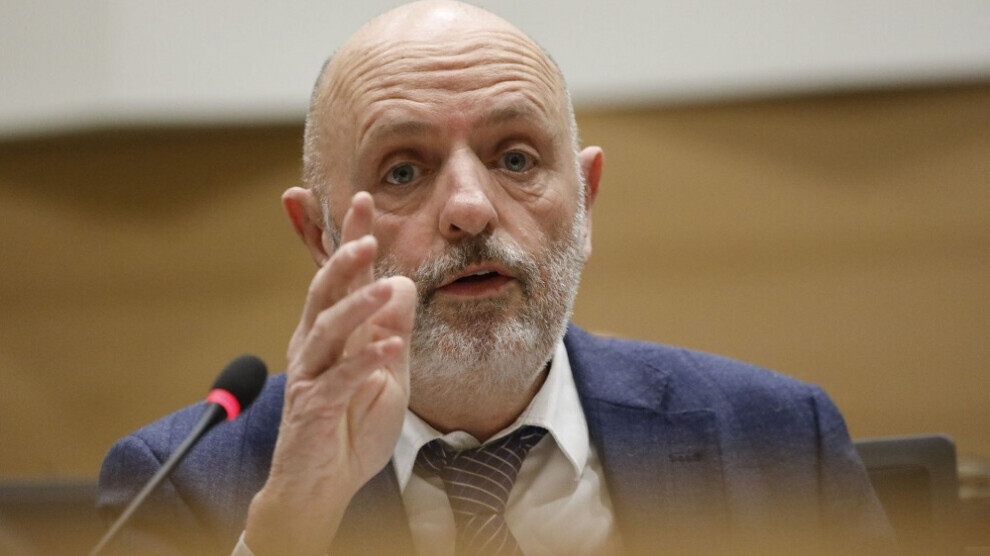The Belgian House of Representatives unanimously adopted a draft resolution recognizing and condemning the Yazidi genocide on July 15. Georges Dallemagne from the Christian Democratic party CDH moved the draft resolution, which was supported by all groups.
While listing the crimes committed by ISIS against the Yazidis since August 2014, a series of demands were also made to the government. These include using all legal means to ensure that the crime of genocide does not go unpunished, contributing to the return of the Yazidis to their homes, rebuilding destroyed villages and towns, and providing special humanitarian aid to women and children.
Speaking to ANF, Belgian parliamentarian Dallemagne explained why he took such an initiative, what Belgium can do concretely and how justice can be provided.
What drove you not to take such an initiative?
I've been to northern Iraq, Iraqi Kurdistan, and Northern Syria many times. I talked to the people fleeing the Islamic State (ISIS). In particular, I interviewed refugees staying in camps near Duhok and Zakho. They told me their shocking stories. These are the stories that are known today. I've been back to these places many times. There are many investigations that underline and show that what happened amounts to genocide. I talked to Baba Sheikh. He asked me that the Belgian parliament recognize the genocide. I made this promise when I met him in a village near Duhok.
What can Belgium do for the Yazidis after the parliament recognized the genocide?
A draft resolution is more than a recognition and a conviction. Undoubtedly, recognition is important, but the decision taken is also a promise for justice and for the return of the Yazidis, reconstruction, health care, assistance to women and children in particular, and prosecution of criminals. It is especially important for the prosecution of Belgian ISIS nationals. There are many Belgians identified by the Yazidis as their torturers and murderers. Among them is Tarik Jadaoun, who is imprisoned in Baghdad. It is a concrete decision about the help we can provide. I will ask the Minister of Foreign Affairs to draw up a roadmap for the implementation of the decision.
So, can this decision have an impact politically, both in Europe and internationally?
It has already had an effect. The Netherlands also discussed a similar text. So it had an effect in Europe. I believe that Belgium's decision on genocide is the strongest, clearest and most important decision taken in my more than 20 years as a parliamentarian. It is a clear and complete text. It will undoubtedly have an impact on international politics.
Technically, will this resolution go to the Senate after the House of Representatives?
No, this is the last step. Such decisions no longer go to the Senate. Technically, it can be said that Belgium recognized and condemned the genocide against the Yazidis through parliament.
However, the Turkish state's threat to Shengal and the Yazidis continues. Can the decision to recognize genocide act as a shield against these attacks?
I hope it can act as a shield against all attacks that make the Yazidis vulnerable. For the first time in the tragic Yazidi history, this tragedy is recognized, and there are concrete things that can be done to try and protect the Yazidi people. At least politically, this recognition is very important.
You also talked about finding and prosecuting the perpetrators. The Northern and Eastern Syria Autonomous Administration demands the establishment of an International Court. Can this be a solution and help in bringing those responsible to justice?
I find it difficult to think about the establishment of an International Court, although this would undoubtedly be ideal. But that should not be an obstacle for national courts. There are examples in France and Germany. We should not wait for an international court to be established. Iraq doesn't want it, the US doesn't want this. It is also difficult in Northern and Eastern Syria, as Rojava has not been given international political recognition. We can continue to demand an international court, but perpetrators must be prosecuted without delay. Victims are waiting for trial.
Are there any jihadists implicated in the crime of genocide and imprisoned in Belgium?
We do not know this because we do not yet have evidence that they were involved in the genocide. We are currently trying to gather this evidence. The investigation continues.














